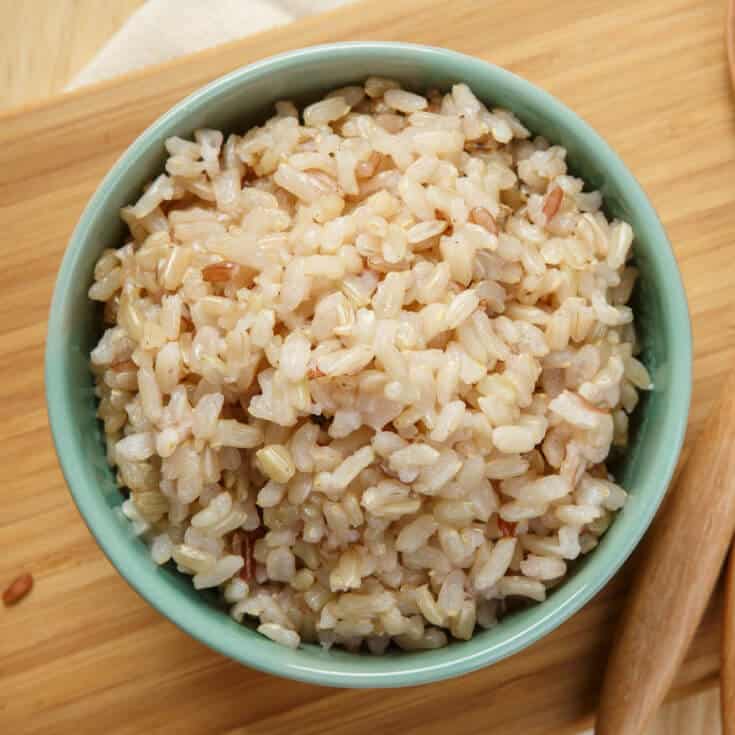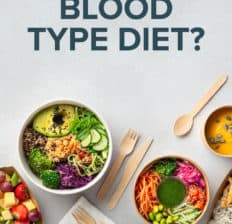This Dr. Axe content is medically reviewed or fact checked to ensure factually accurate information.
With strict editorial sourcing guidelines, we only link to academic research institutions, reputable media sites and, when research is available, medically peer-reviewed studies. Note that the numbers in parentheses (1, 2, etc.) are clickable links to these studies.
The information in our articles is NOT intended to replace a one-on-one relationship with a qualified health care professional and is not intended as medical advice.
This article is based on scientific evidence, written by experts and fact checked by our trained editorial staff. Note that the numbers in parentheses (1, 2, etc.) are clickable links to medically peer-reviewed studies.
Our team includes licensed nutritionists and dietitians, certified health education specialists, as well as certified strength and conditioning specialists, personal trainers and corrective exercise specialists. Our team aims to be not only thorough with its research, but also objective and unbiased.
The information in our articles is NOT intended to replace a one-on-one relationship with a qualified health care professional and is not intended as medical advice.
The Blood Type Diet: Are There Any Real Benefits?
April 20, 2023

The most popular book detailing the blood type diet, “Eat Right for Your Type,” is a New York Times best-seller that has sold more than 7 million copies worldwide since its publication in 1996. Dr. Peter D’Adamo, creator of the blood type diet, has since released several follow-up books with new recommendations and additions, including “Live Right for Your Type” and the 20th anniversary revised edition of “Eat Right for Your Type.”
Given its popularity, you’re probably wondering if there’s any evidence that the blood type diet is actually beneficial.
Even though certain personalized diets can be very effective for improving health markers — for example, those that help manage food allergies or conditions like high blood pressure, high cholesterol and diabetes — there isn’t much convincing evidence supporting the use of blood type diets. In fact, a 2013 systematic review published in the American Journal of Clinical Nutrition stated, “No evidence currently exists to validate the purported health benefits of blood type diets.”
What type of “personalized diet” might be a better alternative to the blood type diet?
A personalized diet is a way of eating that is based on genetics, unique reactions to different types of foods and individual preferences. A personalized diet can help give you a better idea of what types of foods you should eat and what types to avoid.
Some research has shown that a group of people can eat the same exact foods, in the same quantities, but experience huge variations in terms of their physiological responses. So while adjusting your diet to your genetics and lifestyle can be a great idea, this doesn’t mean your diet needs to be based on your blood type.
What Is a Blood Type Diet?
A blood type diet is one that “makes health and nutrition recommendations based on your unique genetic individuality.” Proponents of the blood type diet believe that a person’s blood type is an important tool for understanding how that person will react to various types of food, habits and stressors.
A blood type diet operates on the premise that people with different blood types (O, A, B, AB) should eat corresponding foods and develop other lifestyle habits that are most suitable to their specific genetic makeups. Due to the variability in a person’s “chemistry,” a person’s blood type is said to determine which types of foods he or she will be able to digest best — for example, animal proteins or fruits — as well as which types they will most likely struggle with.
Dr. D’Adamo, a naturopathic physician, was the first person to introduce the idea of a blood diet type in his book “Eat Right for Your Type,” which was originally published in 1996. D’Adamo based his suggestions on research he had done regarding the dietary habits of ancestral tribes and communities.
He postulates in his books that the different blood types developed during periods in history when people had access to only certain foods, which contributed to changes in their digestive systems and their ability to tolerate different foods. He specifically bases many of his recommendations on varying levels of stomach acids and enzymes that he links to different blood types.
There is some evidence showing that blood type is associated with genetic variants in humans and may have an impact on risk factors for certain diseases, such as cancer, diabetes, malaria and cardiometabolic disorders. So while knowing your blood type and family history might be helpful in determining your risk for a particular disease, there is still no evidence showing that certain diets are more or less beneficial for different blood types.
For example, some studies have found that when people of different blood groups follow a plant-based diet low in processed foods (similar to a type A diet), all experience health improvements regardless of blood type.
In addition to promoting the blood type diet, D’Adamo now encourages people to also avoid most sources of lectins, which are “antinutrients” or sugar-binding proteins that can interfere with nutrient absorption to some degree. D’Adamo says that foods containing lectins are incompatible with certain blood types, and therefore his latest book focuses on improving gut health and immunity by eliminating the biggest sources of certain lectins.
However, studies to date have not found any evidence of an association between specific blood types and lectin intolerance.
The Different Blood Types
According to the creators of the blood type diet, people’s susceptibility to certain illnesses and medical conditions are directly related to the type of blood they were born with. Because blood type varies from person to person, all people do not have the same basic nutritional needs, even if they are related or have very similar lifestyles.
There are four human blood types: A, B, AB and O.
- O is the most common blood type. About 44 percent to 45 percent of people living in the U.S. have type O blood.
- About 40 percent to 42 percent of people living in the United States have type A blood.
- About 10 percent to 11 percent of people living in the U.S. have type B blood.
- AB is the least common blood type. Only about 4 percent of people living in the U.S. have type AB blood.
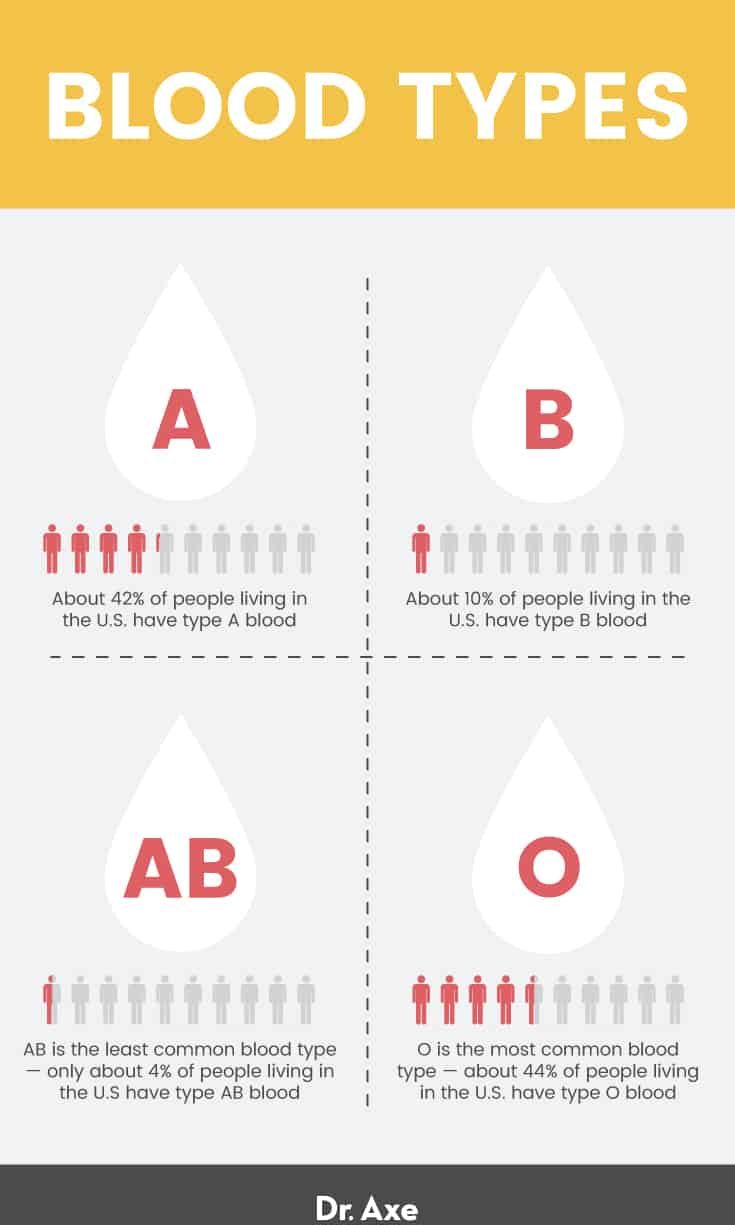
Blood types are distinguished by antigens produced by the immune defense that appear on the surface of red blood cells. If you have the A antigen, you have type A blood, and if you have the B antigen, then you have B blood.
If you aren’t sure of your blood type, you can determine which you are by performing a blood type test at home or having one performed at your doctor’s office or lab. However, once you read on you may determine that knowing your blood type isn’t actually necessary or very useful when it comes to making dietary improvements (although you’ll need to know before a blood transfusion and during pregnancy).
How to Follow a Blood Type Diet
Many people who choose to follow the blood type diet believe that it’s important to eat in a way that mirrors how their ancestors ate, based on the premise that genetics highly influence nutritional needs. In this way, the blood type diet has certain things in common with Paleo diet (or the “ancestral diet” as it’s sometimes called). Even though the Paleo diet might not be a great fit for everybody, adherence to this way of eating has been shown in studies to have many health benefits.
Below are general recommendations, according to authors of books and meal plans about the blood type diet, for which types of foods to eat according to your blood type:
If you are blood type A:
Some refer to blood type A people as “agrarians” or “cultivators” because connections have been made between this blood type and ancestral farming or horticultural practices. According to D’Adamo, type As are better at digesting carbohydrates than other blood types, but they struggle to digest and metabolize animal protein and fat.

- Follow a meat-free, vegetarian diet most or all of the time.
- Foods that are emphasized most are vegetables, fruits, legumes and gluten-free grains. Some of the best choices include apples, avocados, berries, figs, peaches, pears, plums, artichokes, broccoli, carrots and leafy greens.
- Get dietary fats from olive oil, coconut oil and other plant fats, like nuts and seeds.
- Organic foods are encouraged since blood type As are said to be sensitive to pesticides sprayed on non-organic foods.
- Avoid most or all meat and dairy products.
- Eat a gluten-free diet by avoiding all wheat and all foods containing wheat flour, barley or rye.
- Don’t drink too much alcohol or caffeine. Do drink lots of herbal teas and water.
- It’s recommended to do mostly low-impact, calming exercises like yoga, tai chi and walking.
- Supplements that are recommended include calcium, iron, and vitamins A and E.
If you are blood type B:
Type Bs are sometimes referred to as “nomads” because they are believed to have ancestral ties to nomadic people who moved around a lot and covered large areas of land. This is said to have helped type Bs develop a high tolerance to a variety of different foods, which means they do best with a balanced diet that includes moderate amounts of all macronutrients.
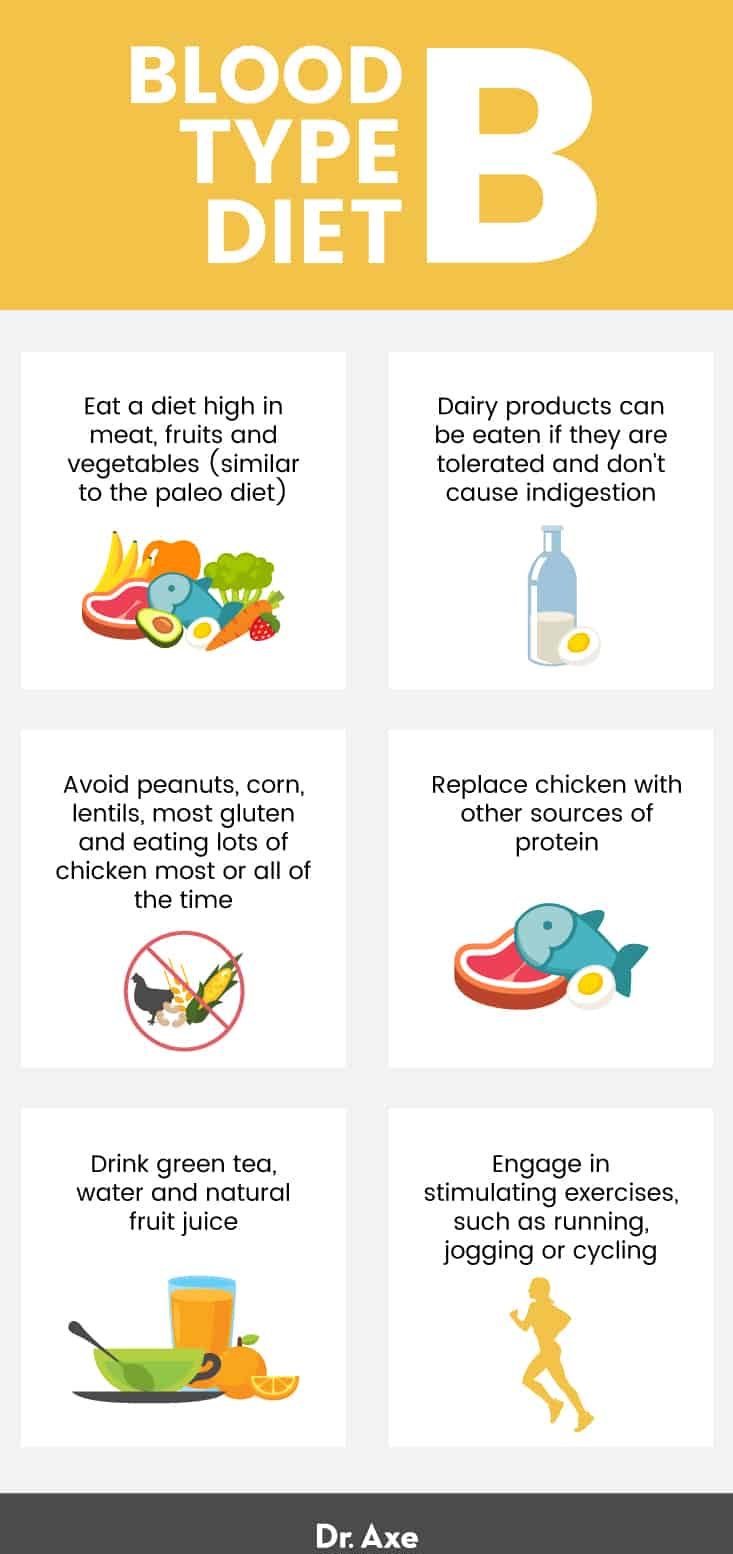
- Eat a diet high in meat, fruits and vegetables (similar to the Paleo diet). Some of the best choices include leafy greens, bananas, grapes, pineapple, plums, olive oil, flaxseed oil, dairy products, turkey, lamb, oatmeal, rice and millet.
- Dairy products can be eaten if they are tolerated and don’t cause indigestion.
- Avoid peanuts, corn, lentils, most gluten and eating lots of chicken most or all of the time. Replace chicken with other sources of protein.
- Drink green tea, water and natural fruit juice.
- Engage in stimulating exercises, such as running, jogging or cycling.
If you are blood type AB:
Type ABs are said to have an advantage over other blood types in that they can digest many different foods and even meals that contain both protein and fat. According to D’Adamo, “Type AB is the only blood type whose existence is the result of intermingling rather than evolution and environment. Thus, they share both the benefits and the challenges of both Type A and Type B blood types.”
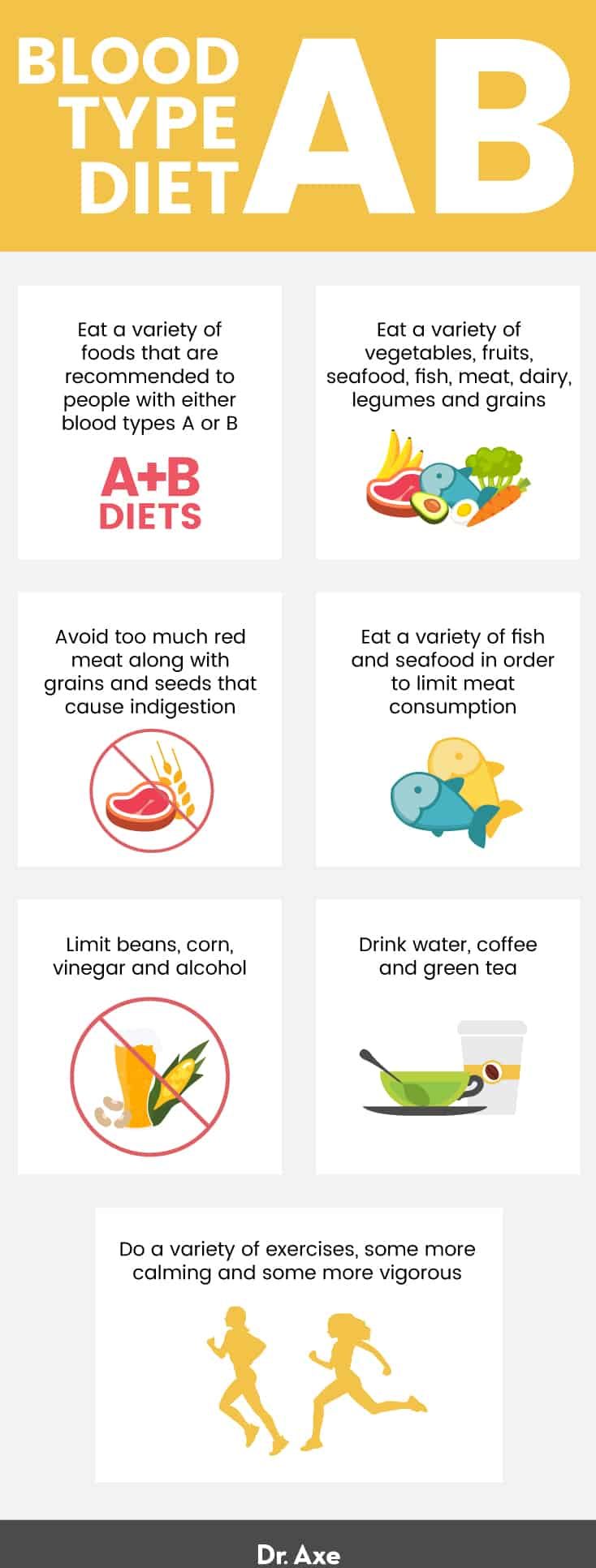
- Eat a variety of foods that are recommended to people with either blood types A or B. This can be thought of as a well-rounded diet, since it includes plenty of fiber, plant foods, and also some dairy and animal sources of protein.
- Eat a variety of vegetables, fruits, seafood, fish, meat, dairy, legumes and grains. Some of the best choices include leafy greens, apricots, cherries, grapefruit, grapes, kiwi, lemons, pineapples and plums.
- Avoid too much red meat along with grains and seeds that cause indigestion. Eat a variety of fish and seafood in order to limit meat consumption.
- Limit beans, corn, vinegar and alcohol.
- Drink water, coffee and green tea.
- Do a variety of exercises, some more calming and some more vigorous.
If you are blood type O:
Type Os are said to have ancestral ties to hunters who consumed a lot of meat, fish and animal foods. Type Os are said to have certain digestive advantages because they can metabolize cholesterol found in animal products more efficiently than other blood types and also better assimilate calcium from dairy products.
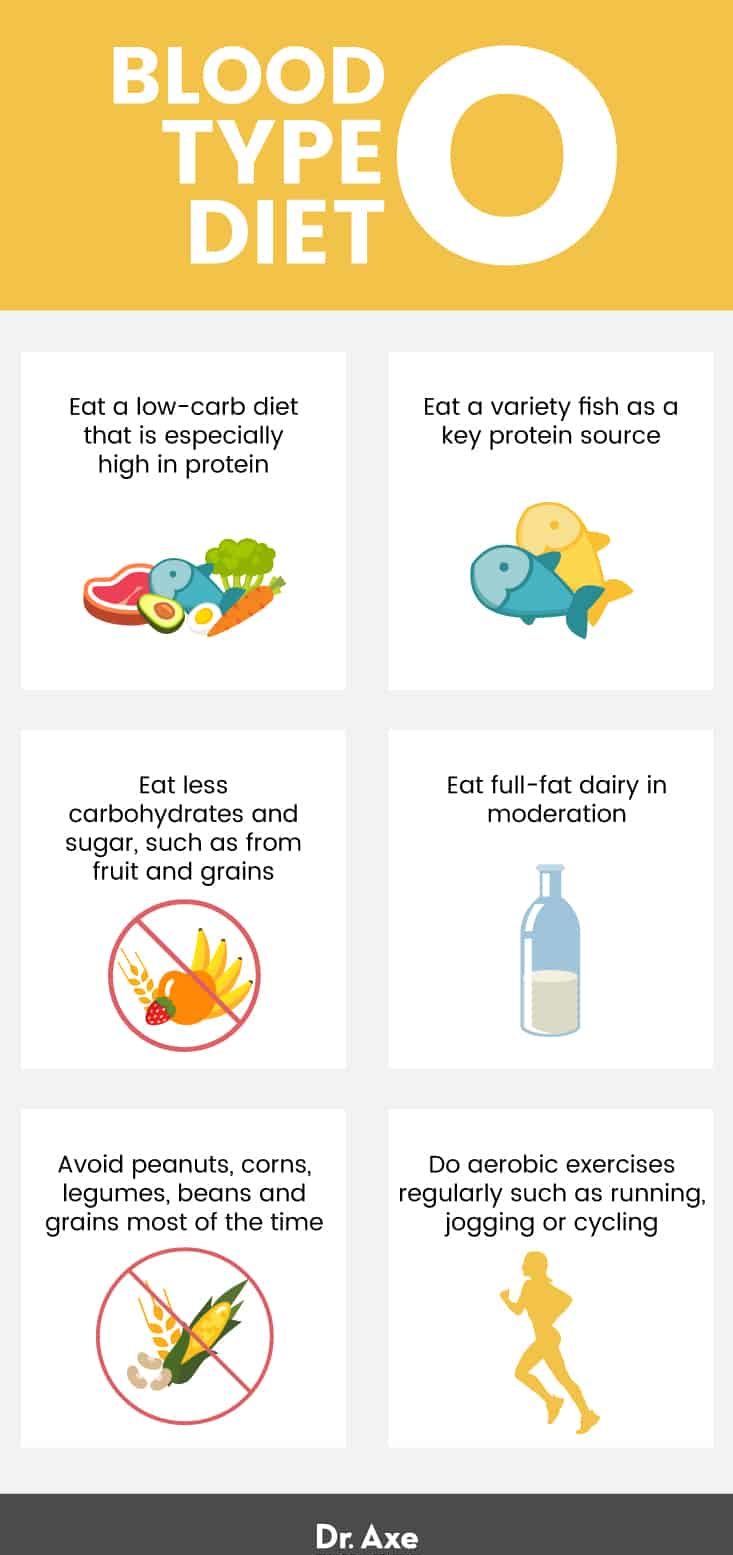
- Eat a low-carb diet that is especially high in protein, such as from fish, lamb, veal, mutton, eggs and other animal sources.
- Fish are an important source of protein. Eat a variety, including bluefish, cod, halibut, mackerel, pike, salmon, sea kelp, snapper, sole, sturgeon and swordfish.
- Eat less carbohydrates and sugar, such as from fruit and grains. Eat full-fat dairy in moderation. Avoid peanuts, corns, legumes, beans and grains most of the time.
- Do aerobic exercises regularly, such as running, jogging or cycling.
Even though the dietary recommendations above might seem restrictive, some flexibility is allowed on the blood type diet. You can think of blood type plans as”suggestions” but also include some foods that are limited according to your blood type in moderate or small amounts.
Purported Benefits
Despite its popularity, the blood type diet definitely has its share of criticisms and doubters. While many health experts believe that people differ in terms of their tolerances for different foods based on genetics, most feel that someone’s blood type does not have much to do with this.
The majority feel that as long as someone maintains healthy digestive and immune systems and adheres to a nutrient-dense, “clean” diet, he or she should not need to worry much about blood type.
Does the blood type diet have any real benefits? As part of the systematic review mentioned above, published in the American Journal of Clinical Nutrition, researchers reviewed 16 articles from a total of 1,415 screened references and found only one article that was even considered eligible according to researchers’ strict selection criteria. Based on their reviews, no studies showed health effects of ABO blood type diets.
Another 2013 review published in the journal PLOS One concluded, “Adherence to certain ‘Blood-Type’ diets is associated with favorable effects on some cardiometabolic risk factors, but these associations were independent of an individual’s ABO genotype, so the findings do not support the ‘Blood-Type’ diet hypothesis.”
Below are some common reasons that someone might choose to try the blood type diet, along with explanations for why the diet may or may not provide any real payoff:
1. Weight Loss?
Like most other diets, many people turn to the blood type diet in hopes of losing weight. It’s possible that following a blood type diet can aid in weight loss, but most likely this has nothing to do with one’s blood type.
More likely it’s because these dietary approaches can be restrictive and at the very least reduce junk foods. Following them also increases awareness of one’s food choices.
In most cases, weight gain is usually tied to overeating (consuming too many calories) and eating foods that promote inflammation and hormonal imbalances. Following the blood type diet means you’re going to have to make certain sacrifices.
If people were to limit the types/variety of foods they eat in general — especially if they avoid most or all processed, high-calorie foods that are not tolerated and lead to poor digestion and other symptoms — then they are likely to limit the chance of overeating calories. Depending on which blood type diet someone follows, weight loss might also result from eating more fiber and/or protein, which are both filling and capable of controlling hunger.
2. Increased Immunity Against Illnesses or Diseases?
Some claim that the blood type diet can contribute toward increased immunity and better protection against certain diseases. However, the same argument as above applies here: When processed/junk foods are removed from the diet and consumption of healthy foods like vegetables or clean proteins is increased, gut health and immunity should improve regardless of what someone’s blood type is.
The real reason that some people may experience health improvements while on the blood type diet is because they are eating more “clean” foods that help lower inflammation and provide protection against common health conditions.
3. Help Managing Headaches, Asthma, Pain and Other Conditions?
Testimonials regarding the blood type diet feature stories about people being able to overcome problems like diabetes, frequent migraines, high cholesterol or blood pressure, asthma, allergies, heartburn, arthritis, and other conditions. Again, it makes sense that these problems would improve if someone were to eliminate junk foods from his or her diet that contain added sugar, refined grains, additives, and potentially too much refined or saturated fat (depending on medical history).
Many of these complaints can be traced back to poor gut health, hormonal imbalances, intolerances or allergies, possibly stress, inactivity, and high levels of inflammation. Improving your diet and lifestyle — such as eating more plant foods, exercising and getting enough sleep/rest — can help correct these problems even without consideration for your blood type.
4. Improved Mental Health and Well-Being?
Some report having more energy and feeling more clear-headed and happier when following the blood type diet. It’s true that there’s a link between the quality of your diet and your mental health. For example, a healthy diet can help manage depression and anxiety, but this doesn’t necessarily have anything to do with blood type.
More accurately, a healthy diet is beneficial for emotional health and well-being because it helps with hormonal balance, neurotransmitter production, sleep and other important physiological processes. It’s also possible that some people feel calmer and more confident when following any diet because it helps them feel empowered, gain a sense of control over their lives and serves as a form of self-care (much like how research shows that exercising improves brain/mental health).
Precautions and Better Alternatives
What are some of the drawbacks to the blood type diet? Below are some concerns regarding why you should consider better alternatives to the blood type diet:
- Doesn’t consider food preferences.
- May be hard to adhere to for more than a couple months due to feelings of deprivation.
- Doesn’t consider your medical history and possible contraindications. Some may have pre-existing medical conditions, allergies or food intolerances that prohibit them from enjoying certain types of foods that are encouraged due to their blood types.
- May recommend unnecessary supplements.
- May be overly restrictive, leading to stress (such as when dining out or in other social situations).
- May contribute to deficiencies in certain nutrients.
Something to point out about the blood type diet is that for the most part it does not take into account someone’s personal food preferences. This can make adherence to the diet difficult, considering that after a few months it’s hard to keep eating a diet that you don’t really like.
For example, you might prefer to eat a higher proportion of carbohydrate foods (such as fruit, legumes or whole grains) and less fat or animal protein — but if your blood type determines that you should eat less carbs, you may have trouble sticking with it. Or, you may feel best if you eat a lot of protein, particularly from animal sources, but your blood type might determine that you need to follow a vegetarian plant-based diet.
The goal should be to develop a healthy, personalized way of eating that you can stick with for many years. It’s important to be realistic about your own preferences and tendencies. I recommend developing your own personalized diet using the following suggestions and tips:
- Increase your intake of fresh vegetables, which is beneficial no matter what type of diet you follow. Also include some fresh fruit, although the amount might vary depending on your medical history and goals.
- Reduce or eliminate sources of added sugar, refined grains and processed fats.
- Avoid foods that cause you any noticeable symptoms along with common allergens, including dairy, gluten, peanuts, eggs or shellfish.
- Get your protein from a mix of quality sources, which can include some plant-based proteins and also animal sources like grass-fed beef, pasture-raised eggs and poultry, wild-caught fish, and raw dairy.
- Eat more fiber from vegetables, fruits, nuts, seeds, beans, legumes and, in moderation, whole grains (if you can tolerate them).
- Include healthy fats throughout your day, such as from coconut oil, olive oil, avocado, nuts, seeds, and animal sources like eggs or meat.
- Consider limiting FODMAP carbohydrates or trying an elimination diet if you suspect that eating certain carbs is linked to your digestive problems.
Final Thoughts
- A blood type diet is one that “makes health and nutrition recommendations based on your unique genetic individuality.”
- According to followers of the blood type diet, blood type (A, B, AB or O) is said to be an important tool for understanding how someone reacts to various types of food, although there’s not strong evidence that this is true.
- Some follow the blood type diet for help with weight loss, enhancing immunity, preventing illnesses and improving well-being.
- Benefits that do occur when someone follows a blood type diet are most likely due to increasing nutrient intake, improving gut health and lowering inflammatory foods in the diet.
- Overall no evidence has shown that there is a link between blood type and having certain nutritional needs.




